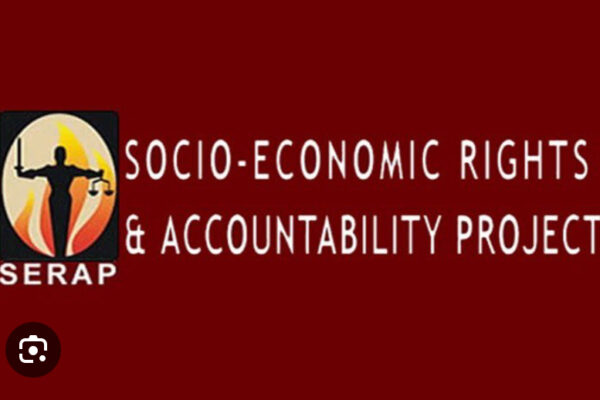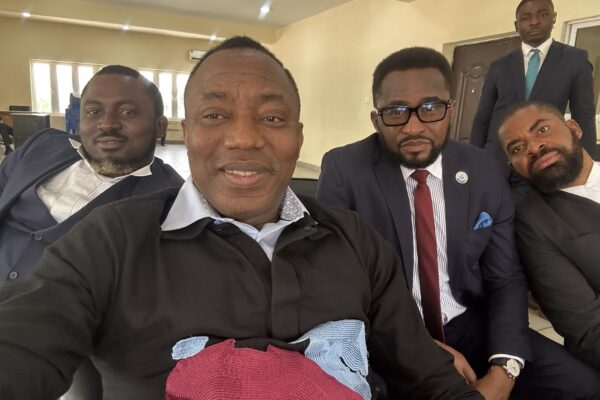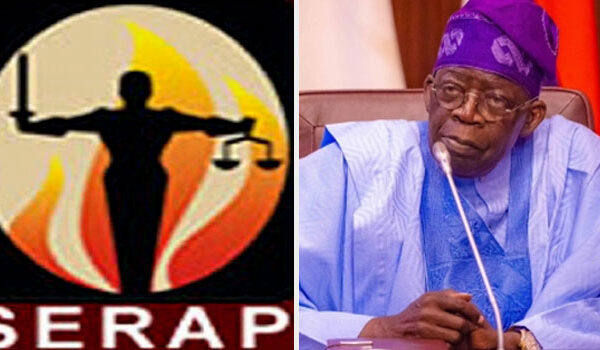
Probe missing N26bn in Ministry of Petroleum Resources, PTDF, SERAP tells Tinubu
Socio-Economic Rights and Accountability Project (SERAP) has urged President Bola Tinubu “to direct the Attorney General of the Federation and Minister of Justice Mr Lateef Fagbemi, SAN, and appropriate anti-corruption agencies to promptly probe allegations that over N26 billion of public funds are missing, diverted or stolen from the Petroleum Technology Development Fund (PTDF) and the Federal Ministry of Petroleum Resources in 2021.” These damning revelations are documented in the 2021 audited report published on Wednesday 13 November 2024 by the Office of the Auditor-General of the Federation. SERAP said, “Anyone suspected to be responsible should face prosecution as appropriate, if there is sufficient admissible evidence, and any missing public funds should be fully recovered and remitted to the treasury.” SERAP urged him to “use any recovered stolen funds to fund the deficit in the 2025 budget and to ease Nigeria’s crippling debt crisis.” In the letter dated 1 February 2025 and signed by SERAP deputy director Kolawole Oluwadare, the organisation said: “There is a legitimate public interest in ensuring justice and accountability for these grave allegations. Tackling corruption in the oil sector would go a long way in addressing the budget deficit and debt problems.” According to SERAP, “The allegations suggest a grave violation of the public trust, the Nigerian Constitution 1999 (as amended), the country’s anticorruption legislation and international anticorruption obligations.” The letter, read in part: “Poor Nigerians have continued to pay the price for the widespread and grand corruption in the oil sector.” “Despite the country’s enormous oil wealth, ordinary Nigerians have derived very little benefit from oil money primarily because of widespread grand corruption, and the entrenched culture of impunity of perpetrators.” “According to the 2021 annual audited report by the Auditor-General of the Federation, the Petroleum Technology Development Fund (PTDF) in 2021 reportedly paid over N25 billion [N25,607,890,403.11] for ‘contracts without any supporting documents.’” “The Auditor-General fears ‘the money may have been diverted.’ He wants the money recovered and remitted to the treasury.” “The PTDF also reportedly failed to account for over N326 million [N326,065,638.00] deposited in two banks. The Auditor-General fears the money may be missing and wants it recovered and remitted to the treasury.” “The PTDF reportedly failed to account for over N107 million [N107,691,733.93] being money for ‘the supply, installation, and commissioning of Library automation system and RFID at the Petroleum Training Institute (PTI).’” “The contract for the library ‘was awarded without the prior approval from the National Information Technology Development Agency (NITDA). The Auditor-General fears ‘the money may have been diverted.’ He wants the money recovered and remitted to the treasury.” READ ALSO CTC of Judgment ordering Buhari’s minister to account for N729bn payment to poor Nigerians“The PTDF reportedly paid over N46 million [N46,974,216.43] to ‘three companies for services without evidence of execution.’ ‘One of the contractors was engaged on 13th April 2021 but was paid for services rendered in March 2021. All the three contractors were paid for periods they had not rendered the services to the PTDF.’” “The Auditor-General fears ‘the money may have been diverted.’ He wants the money recovered and remitted to the treasury.” “The PTDF also reportedly failed to remit over N60 million [N60,355,670.03] of ‘stamp duty from the capital expenditure contracts awarded in 2019 and 2020.’ The PTDF ‘provided no reason why the money was not remitted.’” “The Auditor-General fears ‘the money may have been diverted.’ He wants the money recovered and remitted to the treasury.” “The PTDF also reportedly failed to account for over N64 million [N64,088,158.44] ‘being payment for store items not supplied.” The Auditor-General fears ‘the money may have been diverted.’ He wants the money recovered and remitted to the treasury.” “The PTDF also reportedly paid over N41 million [N41,367,493.50] ‘for services not yet performed or goods not yet supplied.’ The payments were made ‘without relevant supporting documents such as invoices, receipts.’” “The Auditor-General fears ‘the money may have been diverted.’ He wants the money recovered and remitted to the treasury.” “The Federal Ministry of Petroleum Resources reportedly spent over N137 million [N137,751,789.85] ‘from the Capital Vote for expenditures which were recurrent in nature without any approval by the National Assembly and the Minister of Finance.’” “The Auditor-General fears the money may be missing. He wants the money recovered and remitted to the treasury. He also wants sanctions applied ‘for gross misconduct specified in paragraph 3129 of the Financial Regulations 2009.’” “The Ministry reportedly failed to account for over N232 million [N232,509,238.21] ‘being payments to seven companies for consultancy services for stakeholders’ engagement in the Niger Delta in January 2021.’” “According to the Auditor-General, ‘the type of engagements and the reasons for contracting the seven companies were not stated. The venue of the engagement remains unknown. This spending of public funds appeared fictitious.’” “The Auditor-General fears “the money may have been diverted.’ He wants the money recovered and remitted to the treasury.” “The Ministry also reportedly failed to remit over N25 million [N25,516,938.00] of ‘taxes collected from payments of N137,929,394.58] made to contractors.’ The Auditor-General fears ‘the money may have been diverted.’ He wants the money recovered and remitted to the treasury.” READ ALSO Xenophobia: African commission to ‘take appropriate action’ on SERAP’s request to sue South Africa for $10bn“The Ministry also reportedly failed to account for over N43 million [N43,533,036.65] ‘being irregular payments for the replacement of broken ceiling.’ The Auditor-General fears “the money may have been diverted.’ He wants the money recovered and remitted to the treasury.” “The Ministry failed to account for over N74 million [N74,721,625.03] ‘being payments made as cash advances granted to officers between March and December 2021 without retirement.’ The Auditor-General fears ‘the money may have been diverted’, and wants it recovered and remitted to the treasury.” “We would be grateful if the recommended measures are taken within 7 days of the receipt and/or publication of this letter. If we have not heard from you by then, SERAP shall consider appropriate legal actions to compel your government to comply with our request in the public…




